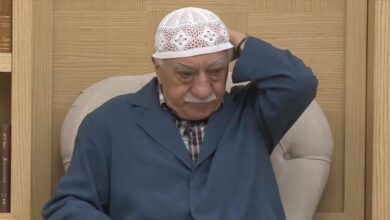 In the Turkish musician and composer Fazil Say’s birthday, famous musician, 43 age is entering with politic problems.
In the Turkish musician and composer Fazil Say’s birthday, famous musician, 43 age is entering with politic problems.
A top Turkish pianist and composer appeared in court on defend himself against charges of offending Muslims and insulting Islam in comments he made on Twitter.
Fazil Say, who has played with the New York Philharmonic, the Berlin Symphony Orchestra and others, is on trial for sending tweets that included one in April that joked about a call to prayer that lasted only 22 seconds.
Say tweeted: “Why such haste? Have you got a mistress waiting or a raki on the table?” Raki is a traditional alcoholic drink made with aniseed. Islam forbids alcohol and many Islamists consider the remarks unacceptable.
Prosecutors in June charged Say with inciting hatred and public enmity, and with insulting “religious values”. He faces a maximum sentence of 18 months in prison, although any sentence is likely to be suspended.
Say, who has served as a cultural ambassador for the European Union, rejected the charges and demanded his acquittal, said the state-run Anadolu agency.
The charges against Say also cite other tweets he sent, including one – based on a verse by famous medieval poet and wine-lover Omar Khayyam – which questioned whether heaven was a tavern or a brothel, because of the promises that wine will flow and each believer will be greeted by virgins.
Say has since closed his Twitter account and has said he plans to leave Turkey for Japan. His lawyer said Say had received some death threats.
Life and Career
Composing is always a form of improvisation: with ideas, with musical particles, with imaginary shapes. And it is in this sense that the artistic itinerary and the world-view of the Turkish composer and pianist Fazıl Say should be understood.
For it was from the free forms with which he became familiar in the course of his piano lessons with the Cortot pupil Mithat Fenmen that he developed an aesthetic outlook that constitutes the core of his self-conception as a composer.
Fazıl Say has been touching audiences and critics alike for more than twenty-five years in a way that has become rare in the increasingly materialistic and elaborately organised classical music world. Concerts with this artist are something else. They are more direct, more open, more exciting; in short, they go straight to the heart. And the same may be said of his compositions.
[adrotate banner=”33″] FETO terror group’s ringleader Fetullah Gulen dies: FETO sources
FETO terror group’s ringleader Fetullah Gulen dies: FETO sources Heatwave: Türkiye is roasting!
Heatwave: Türkiye is roasting! Flixbus accident on A9: Five dead, many injured – hospitals alerted
Flixbus accident on A9: Five dead, many injured – hospitals alerted Court temporarily stops Assange’s extradition
Court temporarily stops Assange’s extradition